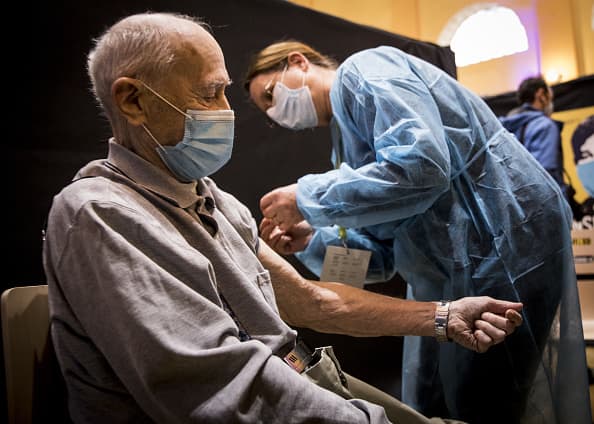
A man over 75 years old is given a vaccine against the coronavirus (Covid-19) shot in Strasbourg, France.
Anadolu Agency | Anadolu Agency | Getty Images
LONDON – Activity in the eurozone fell to a two-month low in January, preliminary figures on Friday showed, amid tougher coronavirus-related lockdowns.
The region is grappling with rising Covid-19 infection rates and tighter restrictions as new strains of virus spread, causing further economic pain.
Markit’s flash-composite PMI for the eurozone, which looks at activity in both manufacturing and services, fell to 47.5 January from 49.1 in December. A value below 50 represents a contraction of the activity.
Chris Williamson, chief business economist at IHS Markit, said a double dip recession for the eurozone “seems increasingly inevitable.”
“Tighter COVID19 restrictions took a further toll on businesses in January,” he said in a statement.
“Production fell at a faster pace, led by deteriorating conditions in the services sector and a weakening of output growth to its lowest level so far during the industry’s seven-month recovery.”
Christine Lagarde, president of the European Central Bank, acknowledged on Thursday that the pandemic still poses “serious risks” to the eurozone economy.
In addition to the new Covid variants, there are also concerns about a slow roll-out of vaccinations in the European Union.
“In this environment, loose monetary stimulus remains essential,” said Lagarde. The ECB decided at a meeting on Thursday to keep interest rates and its broader stimulus programs unchanged for the time being, after stepping up its support in December.
The ECB expects the GDP (gross domestic product) of the eurozone to grow by 3.9% in 2021 and by 2.1% in 2022. This is after a contraction of 7.3% last year. However, these forecasts depend on the evolution of the pandemic.
France is taking on more
Previously, data on France’s business activities also hit a two-month low, reflecting the imposition of stricter curfews across the country. The country’s composite PMI for January was 47, representing a contraction.
However, in January, French companies hired more workers – the first increase in the number of jobs in nearly a year.
“The fact that companies have returned to recruiting activity indicates some confidence in an economic recovery in the second half of this year,” Eliot Kerr, economist at IHS Markit, said in a statement.
In Germany, business was able to grow slightly in January, with a flash composite output index of 50.8. However, the talk represented a seven-month low for Europe’s economic engine.
Phil Smith, associate director at IHS Markit, pointed to slower momentum in manufacturing activity in the country and a continued hit for the services industry in January.
“Overall, the German economy has gotten off to a slow start to the year, and the extension of the current containment measures to at least mid-February means that this looks like the picture for several more weeks,” he said.
The German government decided a few days ago to extend the national lockdown until February 14.